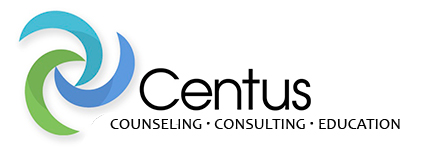
Child & Adolescent Counseling
It is no secret that childhood and adolescence include a wide range of developmental challenges and opportunities. Centus therapists relate well with kids and teens using therapeutic tools designed to support healthy resolution of trauma, emotional expression, and relational skills. Therapists use empirically validated, creative treatment methods for younger kids that include sand tray, play, art, and drama therapy. Teens engage in the use of the arts in therapy but are also equipped to do small step problem solving, use proactive, solution-focused strategies, develop positive core beliefs and self-esteem.

Couple & Family Counseling
Relationships need to have at least a 5:1 ratio of positive to negative experiences in order to be supportive, constructive and life-giving. In the flow of inevitable life stressors, our intimate partnerships or our family life can become painful, and even destructive. Centus therapists help couples, or family members identify strengths in themselves and one another that allow for resilience to emerge for the individuals involved and then support partners or family members in engaging in constructive dialogue and problem-solving. The goal of our therapy with couples and families is positive, vital, mutually supportive connections.

Individual Therapy
The late Dr. M. Scott Peck asserted in his classic work The Road Less Traveled, “Life is difficult.” He went on to state that the sooner we accept that life will be filled with challenging and even painful experiences the easier it will be to find balance, growth, and the ability to freely give and receive love. At any age, we can use a compassionate, trained companion to help us sort out how we are stuck in negative patterns of thinking and behaving. Understanding the source of our current life stressors, identifying current strengths, and areas where we need new skills can transform life’s obstacles into meaningful growth.

Community Based Services
Sometimes it simply does not work for individuals to receive counseling services in a traditional office-based setting. When this is the case, many Centus therapists are available to meet with clients in their chosen community location and/or home setting. While confidentiality is always a primary concern, the comfort of the client is also key to being able to identify and express their thoughts and feelings that lead toward growth, learning and recovery. This could mean a therapy session while walking in a park or neighborhood, in a quiet corner in a coffee shop, in your living room or at your kitchen table.

Community Education
Centus Clinicians are skilled and highly trained in developmental theory, treatment modalities, and the integration of intellectual, physical, emotional, cultural and spiritual resources to support recovery. At the same time, they have a wide variety of specialized knowledge, skills, and tools that can be taught through community-based Psycho-Educational offerings. Topics range from aging gracefully, coping with grief, effective parenting, dealing with stress, depression or anxiety, mindfulness, conflict resolution, the power of forgiveness, to QPR Suicide Prevention Training and Mental Health First Aid. Community Education in 2020 is supported by a generous grant from The Rose Community Foundation.

School Counseling Program
The Centus School Counseling Program puts counselors and clinical social workers into schools that would otherwise have no access to high-quality mental health services, which are integral to a school’s ability to establish a healthy culture that promotes student development and achievement. Founded in 2010, the program is focused on addressing learning disorders as well as mental health and social issues among school-aged children while equipping parents and teachers with the resources they need to help students thrive both in and out of the classroom.

Spiritual Direction At Centus
“Listen carefully with the ear of your heart.” – Rule of St. Benedict
Spiritual Direction is the exploration of a person’s spiritual path in the context of a one-to-one trusting relationship with a Spiritual Director, also known as a Spiritual Guide or Spiritual Companion. A Spiritual Director is trained in sacred listening, deep reflection, and discernment to aid an individual Directee to develop a deeper relationship with and understanding of the spiritual aspects of their life, relationships, and identity.

Imago Relationship Therapy (IRT)
It is designed to help conflict within relationships become opportunities for healing and growth. The approach is also designed to help good relationships gain new tools and perspectives on further developing the depth of the connection between partners. The term “imago” is Latin for “image,” and within the context of IRT, it refers to our individual “emotional blueprint” or our “unconscious image of familiar love.”
